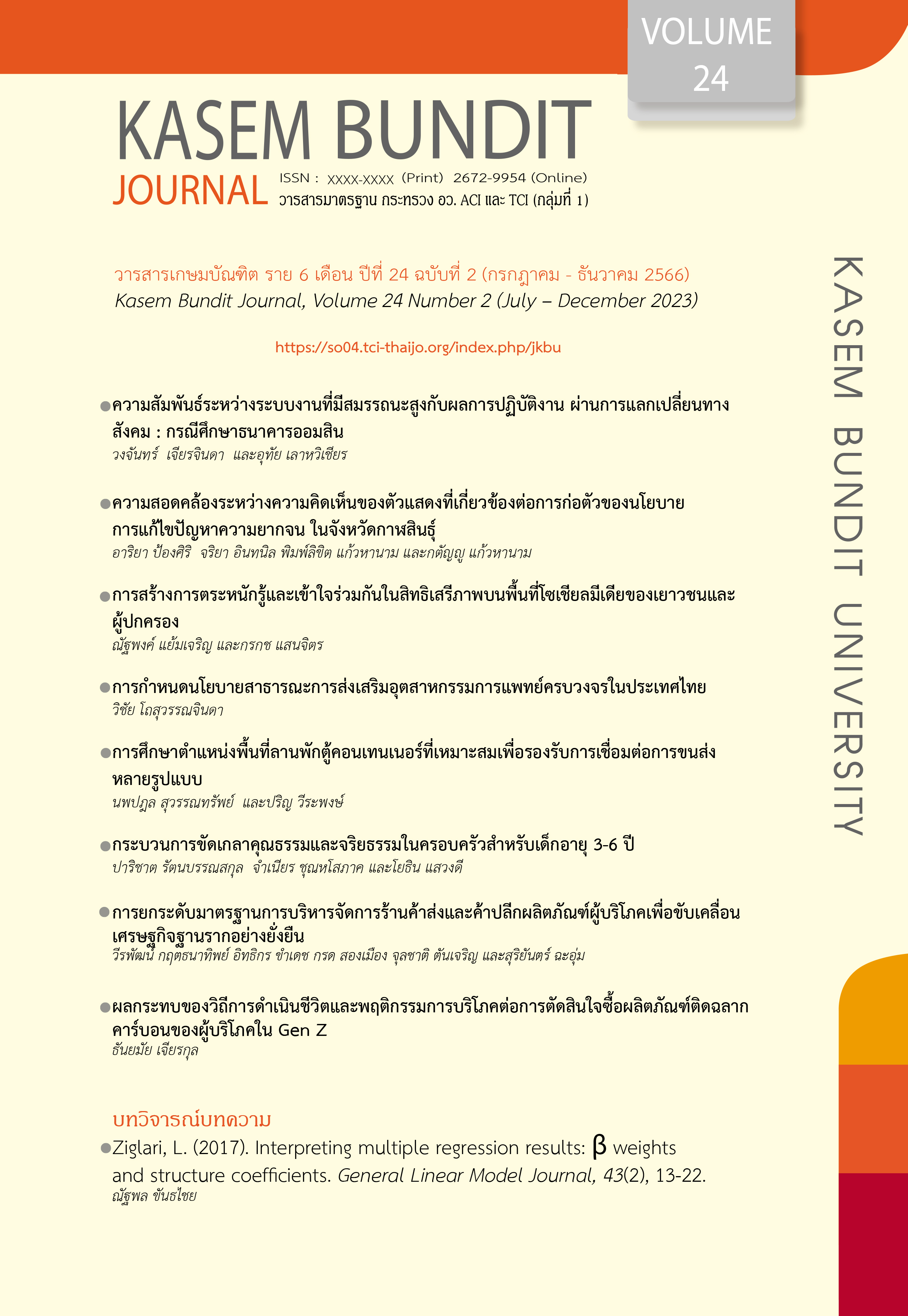The consistency among the opinions of actors in the formulation of poverty alleviation policy in Kalasin province
คำสำคัญ:
ตัวแสดงทางนโยบาย, การก่อตัวของนโยบาย, ความยากจน, โครงการคนกาฬสินธุ์ไม่ทิ้งใครไว้ข้างหลังบทคัดย่อ
PURPOSES: To examine the consistency among the opinions of relevant actors in the formulation of policies to address poverty alleviation in Kalasin province. METHODS: The research methodology used was sample survey research of 408 individuals and semi-structured interviews of 15 key informants. RESULTS: It was revealed that 76.8% of the actors agreed with the overall poverty alleviation policy, 77.8, 77.6 and 74.6 percent in government, local organization, and non-government organization respectively. THEORETICAL/POLICY IMPLICATIONS: The poetry alleviation policy is appropriate in the opinions of the actors concerned.
เอกสารอ้างอิง
Chamaram, S. (2559). Scopes, concepts, and theories of public administration. Faculty of Law and Political Science, Roi Et Rajabhat University.
Daoming, W., & Ruankham, W. (2564). An analysis of poverty reduction policies of Xi Jinping. Suthiparithat Journal, 35(3), 249-270.
Kalasin Provincial Office. (2564). Kalasin happiness model. http://www.kalasin.go.th/happiness/?fbclid=IwAR3ZG_5BV2NbOkunsRb_NrlbX6pryYrHHStlIg6Ht51BxzAiid5iUaTS9Gs,
Kenaphoom, S. (2559). Political decision on the democratic way of life: concept and forms. Humanities and Social Sciences, 33(2), 89-120.
King Prapokgua's Institute. (2562). Transcending the Paleness: Challenges of Thai Society. King Prajadhipok's Institute.
Kingdon, J. W., & Stano, E. (1984). Agendas, alternatives, and public policies. Little, Brown.
Likert, R. A. (1932). Technique for the measurement of attitude. Archives Psychological. 3(1), 42-48.
Luangprapat, W. (2563). Cooperation-based governance: A decentralized society dispersion in the public administration system and seeking a new model for driving the mission of the state. King Prajadhipok's Institute.
Mankong, C. (2564). Dimensions of poverty and root causes of inequality with sustainability in development. Economia and Public Policy Journal, 12(24), 18-48.
Marsh, D., & Smith, M. (2000). Understanding policy networks: Towards a dialectical approach. Political Studies, 48,4-21.
Office of the National Economics and Social Development Council. (2564). Thailand multidimensional poverty report 2021.
https://www.nesdc.go.th/ewt_dl_link.php?nid=13043, September 6, 2020.
Phueakbuakhao, W., Tuwanuti, P., & Bhowbhadee, C. (2560). Policy formulation for enhancing trade along Thailand –Myanmar border of Prachuap Khiri Khan province. Veridian E-Journal, Silpakorn University, 10(3), 68-85.
Punyawutpreeda, P. (2564). The policy making of Thai political parties according to the constitution B.E.2560. Journal of MCU Social Development, 6(3), 264-276.
Rhodes, R. A. W. (2007).Understanding governance: Tenyears on. Organization Studies. 28(08),1243–1264.
Sansaneewittayakul, I. (2556). The analysis of social enterprise policy by using policy network. Journal of Modern Management Science, 11(2), 39-57.
Singmart, S., Wangphon, P., & Meemana, P. (2565). Guidelines to public policy making Integrated. Journal of Graduate Saket Review, 7(1), 73-82.
Udomwittayapaisarn, S., Tossamas, P., & Phosing, P. (2562). Decision theory in public policy formulation. Journal of Graduate School, 16(72), 1-9.
United Nations Development Programme. (2022). Global multidimensional poverty index (MPI) 2022. https://hdr.undp.org/content/2022-global-multidimensional-poverty-index-mpi#/indicies/MPI.
ดาวน์โหลด
เผยแพร่แล้ว
รูปแบบการอ้างอิง
ฉบับ
ประเภทบทความ
สัญญาอนุญาต
ลิขสิทธิ์ (c) 2023 วารสารเกษมบัณฑิต

อนุญาตภายใต้เงื่อนไข Creative Commons Attribution-NonCommercial-NoDerivatives 4.0 International License.
Any views or opinions expressed in this issue of the Kasem Bundit University Journal are those of the authors alone and do not necessarily reflect the views or opinions of Kasem Bundit University or the editors.







